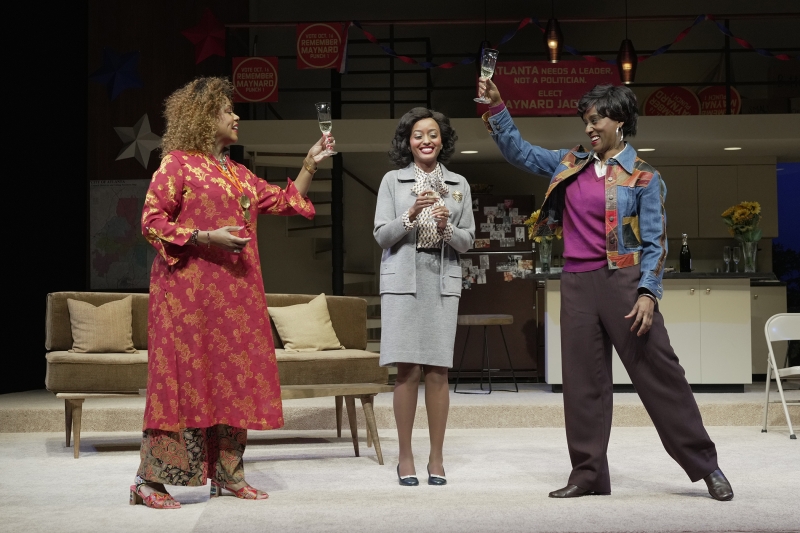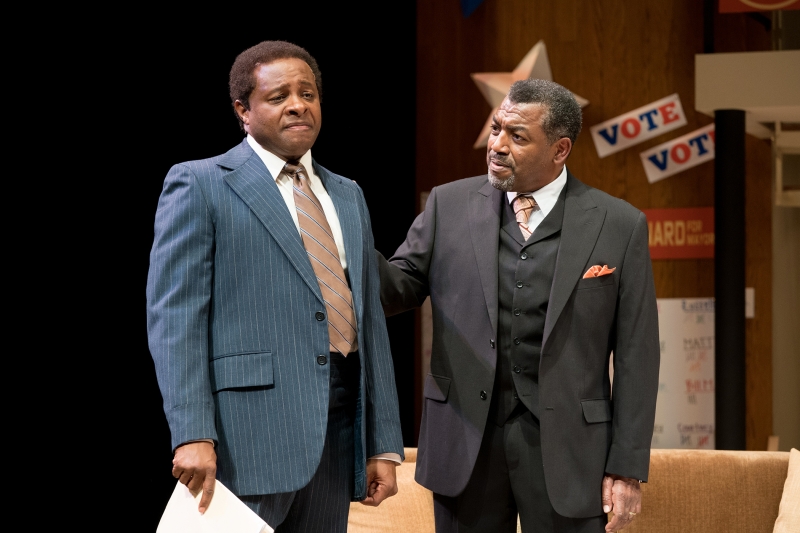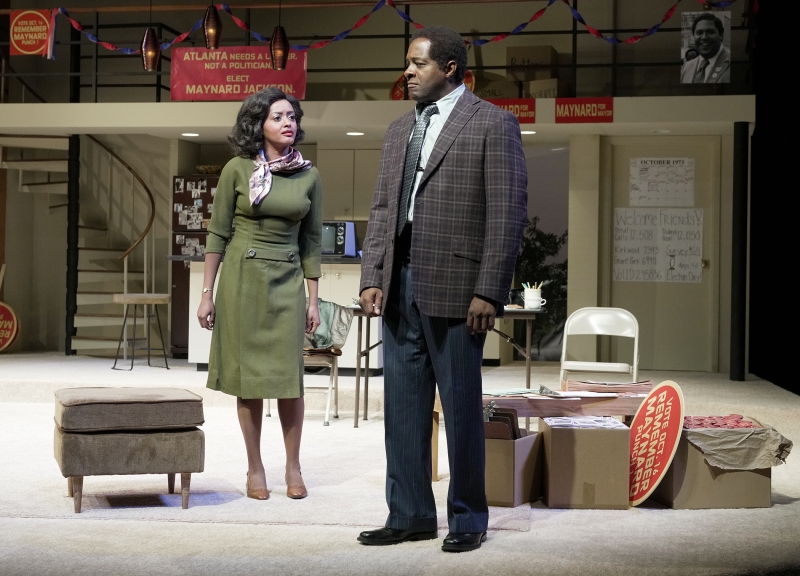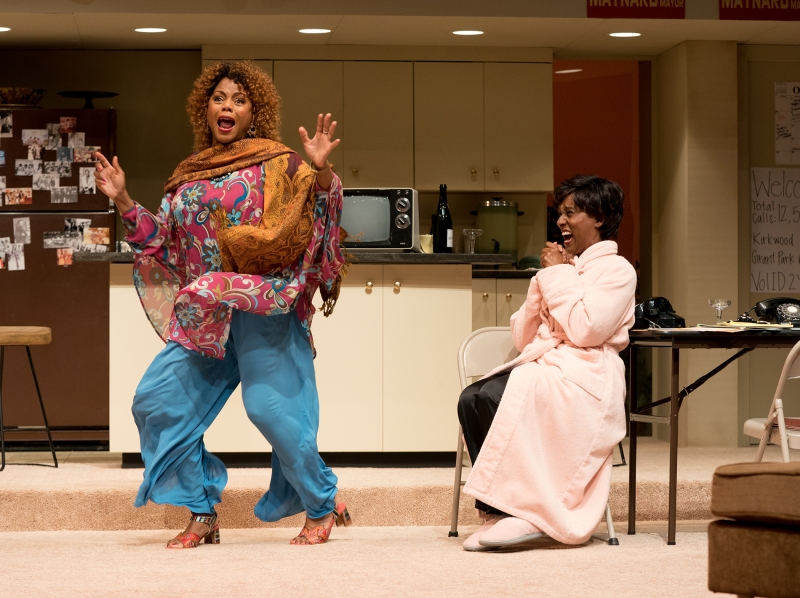Review: Amusing Interplay Surrounds WHAT I LEARNED IN PARIS at South Coast Rep
Pearl Cleage's period dramedy incites laughs thanks to its engaging, superb ensemble cast

According to the theater program for the comedic play WHAT I LEARNED IN PARIS---now on stage at South Coast Repertory in Costa Mesa through March 19, 2022---we learn that the play's author, playwright Pearl Cleage, worked on the staff of the historic winning campaign to elect Maynard Jackson to be Atlanta's first ever African-American mayor back in 1973, which ushered forward a progressive new era that would reshape the social and political identity of the region. Post-election, she even transitioned to become the new mayor's press secretary and director of communications.
So, understandably by sheer proximity, Cleage's role in this part of history would have given her a potentially overflowing bounty of material to fashion works of theater around the inner workings and political intrigue of being inside Maynard's inner circle. Yet interestingly enough, the expectation of seeing a highly-charged, politically-minded drama about Maynard's history making win---material that would have been rather moving to watch in our current racially charged times---is instead eschewed in favor of an amusingly soapy, sitcom-like comedy whose main focus is a romantic triangle between a young campaign staffer and two much older men who each are about to gain more power and influence amidst the new mayor's election.
Though, yes, it is set against the backdrop following Maynard's winning bid as Atlanta's new mayor, WHAT I LEARNED IN PARIS tracks the scandalicious melodrama that unfolds when hardworking, reliable campaign staffer Lena Jefferson (a terrific Celeste M. Cooper) catches young secretary Ann Madison (Kaye Winks) secretly smooching with lawyer John Nelson (James T. Alfred), thinking everyone had already vacated the campaign HQ.
Such a romantic tryst that blossoms from working closely together on such a history-making, life-changing campaign would be fine ordinarily, but here, it is a definite cause for scandal.
Why? Because Ann is already married to influential lawyer J.P. Madison (A. Russell Andrews), the man who spearheaded Maynard's election campaign and is now on the top of the new mayor's short list to become the city's new district attorney. Even more complicated---John Nelson works as J.P.'s junior partner. John admits to Lena that he has fallen deeply in love with Ann.

Tensions rise even more upon the sudden arrival of J.P.'s ex-wife Eve (the glorious Erika Lavonn), back in town from San Francisco where she has absorbed both the free-flowing frocks and free-flowing philosophy of her California lifestyle. She has returned to the "new" Atlanta with the aim of establishing a new center for cultural and political discourse.
Regal in mannerisms and movement, Eve floats ethereally into every space with a command and majesty that is both intimidating and fascinating. Lena is in awe and takes to her charms immediately, allowing herself to be the former Mrs. Madison's sole true ally and (sometimes) co-conspirator. Eve---who, not surprisingly, will divulge the philosophy behind the play's title---represents, in a way, for both Lena and Ann, the ideal of how far African-American women can spiritually ascend and navigate in this new geopolitical world. Is it possible to attain personal growth while continuing to work towards the Big Cause that Maynard's election has opened?
Amusing and filled with droll, witty banter, WHAT I LIKED ABOUT PARIS is funny and thoughtful and, overall, a delightful surprise. Though it can't shake its sitcom-like machinations, the play itself, under the direction of Lou Bellamy, works this structure in an effective and entertaining way, allowing for scenes to transpire then resolve with moments for audience laughter and without lulls. Even occasional scene transitions that bump up classic soul tracks keep the audience smiling and grooving in between.
The collective ensemble is quite engaging to watch, particularly the women in the cast whose performances of their respective characters reveal so much more than what mere dialogue can. As the observer, Cooper's excellent work as Lena is almost like seeing her as the audience's stand-in, as she acts and reacts to the drama with equal inquisitive giddiness and supportive concern. Winks plays Ann like a hysterical ingenue at first, but then reveals a surprisingly mature young woman by the play's end---an enjoyable arc to witness that feels earned by what transpires for her. Her character represents the tug-of-war that this new era has unearthed: should she choose real love over choosing to side with historical significance?
And as Eve, LaVonn is a bonafide scene stealer, enchanting and captivating and utterly believable as the (eventual) Queen of all she surveys---and someone who has genuinely found a way to be both socio-politically conscious and personally fulfilled.
Alfred and Andrews are also quite good in their respective roles and offer great support for the more fleshed-out women in Cleage's play.
Even without knowing where and when this takes place, Dana Rebecca Woods' 70's period costumes and scenic designer Vicki Smith's living room / temp campaign HQ set establishes the era and story authentically, right down to the campaign posters scattered about and an unmissable spiral staircase that, for one scene, allows for Eve---in her colorful Haight-Ashbury dresses---to look as if she's ascending wind-swept to heaven, signaling to all that, yes, she is much more enlightened and zen than you.
I do, however, have a minor complaint about the set. What I mostly object to (and was, frankly, a bit distracted by) is the fact that characters ring a doorbell then, magically, waltz into the house soon after. Is there an uncredited maid/butler opening this off-stage door for people entering the house? An actual door visible to the audience that is opened by another character after a doorbell would have made those details more sensical.

One of my favorite lines from the play sums up the main dilemma at the center of Cleage's narrative:
"If I would've known that the revolution didn't make room for love, I wouldn't have worked so hard to fight for it."
In WHAT I LEARNED IN PARIS, the playwright---via her characters---posits that fighting for a just cause doesn't always mean sacrificing what you love.
* Follow this reviewer on Twitter: @cre8iveMLQ *
-----
Photos by Jenny Graham for South Coast Repertory.
Performances of Pearl Cleage's WHAT I LEARNED IN PARIS, directed by Lou Bellamy continue at South Coast Repertory through March 19, 2022. Tickets can be purchased online at www.scr.org, by phone at (714) 708-5555 or by visiting the box office at 655 Town Center Drive in Costa Mesa.
Comments
.png)
|
.png)
|
Videos


